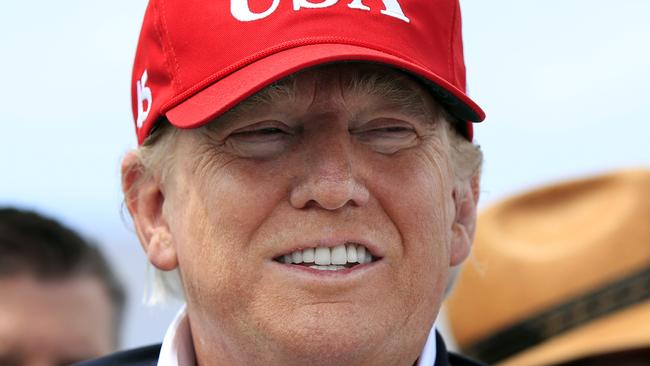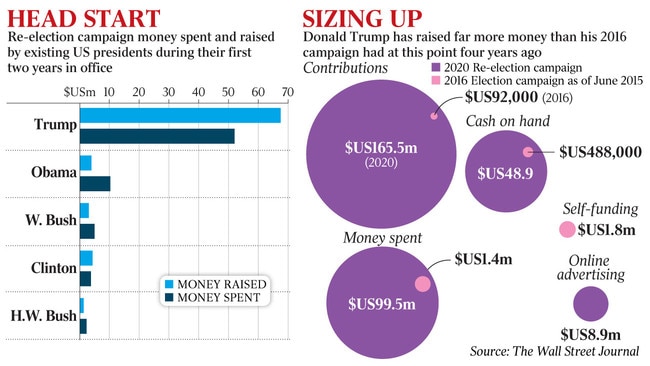Florida crucial to Trump’s re-election hopes
Trump’s chances of re-election diminishes if he doesn’t repeat victory in the largest battleground state.

Backstage at a rally last month at Panama City Beach, Florida, Donald Trump unveiled a poll hidden inside his jacket that he said showed him winning the state. “How we doing?” he asked his team. “Are we going to win?”
The US President’s acute interest in Florida extends beyond a desire to win his adopted home state. His chance of re-election significantly diminishes if he doesn’t repeat victory in the US’s largest perennial battleground. It is why his ceremonial 2020 kick-off will be held today in Orlando.
The campaign is preparing for another close fight, but Florida provides a measure of comfort compared with other states that were crucial to Trump in 2016, particularly Pennsylvania and Michigan. Democratic gains made during the midterm elections didn’t materialise in Florida.
“If you are asking me today, I would say Trump will carry Florida,” says Alex Sink, the Democratic governor nominee in 2010. The President was involved in picking Florida to open the campaign and is eager for a dramatic showing at the 20,000-seat arena in Orlando. He will spend the night at his golf resort near Miami and hold a fundraiser with per-person admission costing up to $US250,000 ($364,000).

Trump’s advisers view Florida, which packs 29 electoral votes and provided 37 per cent of his victory margin in 2016, as trending more Republican, pointing out that Democrats hold just one statewide elected office. In 2016, Trump won Florida’s Panhandle by about the same margins as 2012 Republican presidential candidate Mitt Romney, which advisers attribute to his struggle to win over traditional Republican voters. But Trump now has full command of the party.
MORE: Up next: four more years
One of Trump’s fiercest primary rivals in 2016, Florida senator Marco Rubio, is now an ally who can help with the fast-growing Hispanic vote. Another opponent, Jeb Bush, has been more muted, but the former Florida governor’s vaunted donor base has shifted to the President.
Also infusing confidence into the campaign is the head start Trump has on the Democratic field. With 10 media markets, Florida is expensive to run campaigns in, and the President’s advisers believe it will be difficult for the Democratic nominee to catch up, financially and organisationally.
Still, Florida is the most consistent battleground. Since 1992, when George HW Bush won the state but lost re-election, six of the seven elections have been decided by five percentage points or less, none more dramatic than George W. Bush’s 537-vote win in 2000. Since 2010, all three governor races and both presidential contests have been decided by 1.2 percentage points or less.
While the Trump campaign says the President has an edge, internal polling from March showed him losing in a match-up with former vice-president Joe Biden, though not as badly as in Wisconsin and Pennsylvania, according to a list published last week by ABC News. A Florida Atlantic University poll last month showed Trump and Biden in a dead heat.
Democratic pollster Fernand Amandi says the Florida rally illustrates concern by the Trump campaign. Yet he worries that Democrats will fail to galvanise the Hispanic vote. Trump has taken steps to strengthen his ties to Cuban voters in south Florida, rolling back his predecessor’s diplomatic thaw. He has taken a tough line with Venezuela, endearing him to a small but growing number of Venezuelan voters in Florida.
“They are not looking to win the Hispanic vote,” Amandi says of Republicans. “They are looking to manage the margins and gain enough to put together a coalition with other voters to get to a majority.”
The Wall Street Journal



To join the conversation, please log in. Don't have an account? Register
Join the conversation, you are commenting as Logout